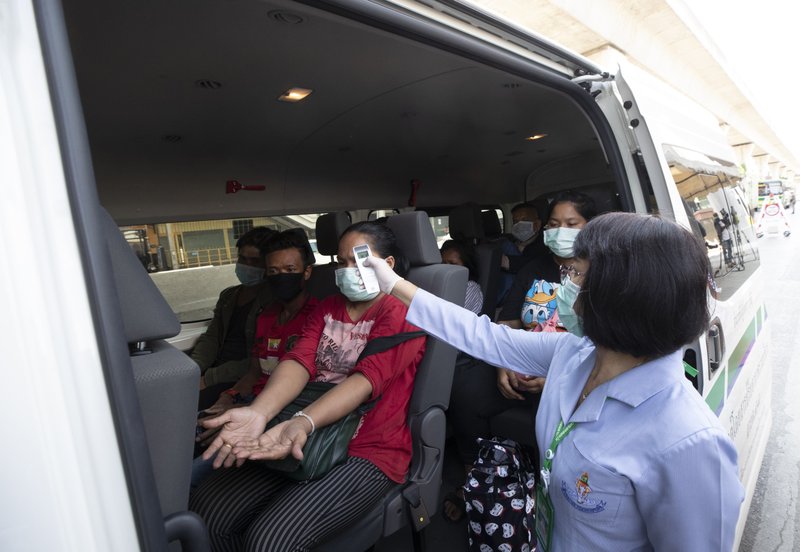
Photo: AP
U.S. deaths from the coronavirus pandemic have topped 1,000, in another grim milestone for a global outbreak that is taking lives and wreaking havoc on economies and established routines of ordinary life.
In a recognition of the scale of the threat, the U.S. Senate late Wednesday passed an unparalleled $2.2 trillion economic rescue package steering aid to businesses, workers and health care systems.
The unanimous vote came despite misgivings on both sides about whether it goes too far or not far enough and capped days of difficult negotiations as Washington confronted a national challenge unlike it has ever faced. The 880-page measure is the largest economic relief bill in U.S. history.
Worldwide, the death toll climbed past 21,000, according to a running count kept by Johns Hopkins University, and the U.S. had 1,050 deaths and nearly 70,000 infections.
Spain’s death toll has risen past 3,400. Lidia Perera, a nurse at Madrid’s 1,000-bed Hospital de la Paz, said more workers were desperately needed. “We are collapsing,” Perera said.
The Spanish parliament voted to allow the government extend strict stay-at-home rules and business closings until April 11.
Such measures are becoming increasingly common in the U.S., where New York is the epicenter of the domestic outbreak, accounting for more than 30,000 cases and close to 300 deaths, most of them in New York City.
Public health officials in the city hunted down beds and medical equipment and called for more doctors and nurses for fear the number of sick patients will overwhelm hospitals as has happened in Italy and Spain.
A makeshift morgue was set up outside Bellevue Hospital, and the city’s police, their ranks dwindling as more fall ill, were told to patrol nearly empty streets to enforce social distancing.
In Washington, President Donald Trump has called for Americans to dedicate themselves for 15 days to social distancing, including staying home from work and closing bars and restaurants to help try to stall the spread of the disease.
Yet, he’s also grumbled that “our country wasn’t built to be shut down” and vowed not to allow “the cure be worse than the problem” —apparently concerned that the outbreak’s devastating effects on financial markets and employment will harm his chances for reelection later this year.
“The LameStream Media is the dominant force in trying to get me to keep our Country closed as long as possible in the hope that it will be detrimental to my election success,” Trump tweeted Wednesday.
Democrats say that Trump was prioritizing the economy over the health and safety of Americans.
“I’d like to say, let’s get back to work next Friday,” said Joe Biden, the front-runner for the Democratic presidential nomination. ”That’d be wonderful. But it can’t be arbitrary.”
Biden said the congressional aid package addressing the outbreak “goes a long way,” but that “meticulous oversight” is required.
“We’re going to need to make sure the money gets out quickly into peoples’ pockets and to keep a close watch on how corporations are using the taxpayers funds that they receive, to make sure it goes to help workers, not rich CEOs or shareholders,” the former vice president said.
Brazil’s President Jair Bolsonaro has also called to reopen schools and businesses, contending a clampdown ordered by many governors will deeply wound the economy and spark social unrest. He called only for high-risk people to quarantine and for governors to lift their stricter measures.
The country’s governors resisted, saying his instructions run counter to health experts’ recommendations and endanger Latin America’s largest population. The rebellion even included traditional allies of Brazil’s far-right president.
Meanwhile, the governor of a state in central Mexico said the poor are “immune” to the coronavirus, even as the federal government suspended all non-essential government activities.
Puebla Gov. Miguel Barbosa’s comment was apparently partly a response to statistics showing that the wealthy, who travel much more, have made up a significant percentage of Mexicans infected to date, including some prominent businessmen. The country has seen six deaths so far.
“The majority are wealthy people. If you are rich, you are at risk. If you are poor, no,” Barbosa said. “We poor people, we are immune.”
Barbosa also appeared to be playing on an old stereotype held by some Mexicans that poor sanitation standards may have strengthened their immune systems by exposing them to bacteria or other bugs.


